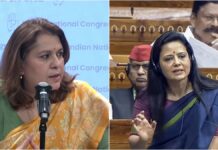A fierce war of words has erupted between Assam Chief Minister Himanta Biswa Sarma and Karnataka Minister Priyank Kharge regarding the allocation of semiconductor manufacturing units in India. This exchange of rhetoric highlights the growing competition among states to establish themselves as key players in the semiconductor industry, crucial for technological advancement.
The spat ignited when Priyank Kharge, the son of Congress President Mallikarjun Kharge, expressed his concerns over the location of semiconductor plants, claiming they are being established in states like Assam and Gujarat due to “political clout” rather than a robust technological or research ecosystem. In a recent interview, Kharge stated, “Five semiconductor manufacturing units, four are in Gujarat, and one is in Assam, but they don’t have the ecosystem of skills or innovation that Karnataka has.”
Kharge took to social media platform X to defend his position, questioning why his support for Karnataka’s interests was being perceived as anti-Assam. He wrote, “CM @himantabiswa ji, when you and PM @narendramodi defend your state’s interests, it’s called a masterstroke. When I do the same for Karnataka, it’s called unfair?”
The Karnataka minister further criticized Sarma’s management of Assam’s industrial sector, pointing to the closure of tea and paper mills in the state. He challenged the state government to address these issues, asking, “CM saab, there is a lot we can learn from each other’s ecosystems. Stop pleasing your political masters and start skilling the State and get investments based on your strengths so that more people are employed.”
In response, Chief Minister Sarma framed Kharge’s comments as a testament to Assam’s rising prominence. He remarked, “In just 3 1/2 years, Assam has been elevated to a position where even Karnataka recognizes our achievements,” asserting that Assam is on track to become a significant player in India’s semiconductor revolution.
The tension escalated further on Tuesday, as several BJP MLAs led a protest march in Jagiroad, the site of the semiconductor plant, accusing Kharge of attempting to undermine the project. This ongoing confrontation underscores the political stakes involved in attracting investment in high-tech industries, as states vie to demonstrate their capabilities and secure their economic futures.
The clash between Sarma and Kharge not only highlights the competitive nature of state politics but also raises questions about the broader implications for India’s technological development and the role of political influence in shaping industrial policies.








I liked up to you’ll receive carried out right here. The sketch is tasteful, your authored material stylish. however, you command get bought an shakiness over that you would like be delivering the following. ill unquestionably come more in the past once more since precisely the same just about a lot often inside of case you shield this hike.
The next time I learn a weblog, I hope that it doesnt disappoint me as a lot as this one. I imply, I know it was my choice to learn, however I actually thought youd have one thing interesting to say. All I hear is a bunch of whining about something that you possibly can fix if you werent too busy looking for attention.
I have been exploring for a little bit for any high-quality articles or weblog posts in this sort of house . Exploring in Yahoo I at last stumbled upon this site. Studying this info So i am glad to exhibit that I have an incredibly just right uncanny feeling I discovered exactly what I needed. I such a lot indubitably will make sure to don’t put out of your mind this web site and provides it a look regularly.
cost of clomiphene no prescription buy generic clomid without dr prescription can you get clomiphene without a prescription how can i get generic clomid pill how to get cheap clomid price clomid without insurance clomiphene for sale in mexico
More articles like this would frame the blogosphere richer.
Greetings! Jolly productive advice within this article! It’s the crumb changes which will make the largest changes. Thanks a portion in the direction of sharing!
zithromax canada – buy cheap tetracycline where can i buy metronidazole
semaglutide 14 mg for sale – buy cyproheptadine 4mg pill periactin buy online
how to buy domperidone – sumycin 500mg usa order cyclobenzaprine without prescription
order amoxil online cheap – buy amoxil medication combivent 100 mcg tablet
purchase augmentin for sale – https://atbioinfo.com/ buy ampicillin without prescription
buy esomeprazole generic – https://anexamate.com/ brand nexium
buy coumadin 2mg – https://coumamide.com/ hyzaar generic
meloxicam order – relieve pain order meloxicam generic
What i don’t understood is in fact how you’re now not actually much more well-liked than you may be right now. You’re so intelligent. You know thus significantly on the subject of this matter, made me for my part consider it from a lot of various angles. Its like men and women aren’t fascinated unless it is one thing to accomplish with Girl gaga! Your personal stuffs nice. Always take care of it up!
order deltasone pills – https://apreplson.com/ deltasone 10mg for sale
cheapest ed pills online – fastedtotake best erection pills
buy amoxicillin tablets – https://combamoxi.com/ oral amoxicillin
order diflucan – https://gpdifluca.com/ buy generic diflucan
escitalopram 20mg tablet – https://escitapro.com/# brand escitalopram 20mg
cenforce canada – https://cenforcers.com/# cenforce order
cheapest cialis – order cialis no prescription cialis recreational use
san antonio cialis doctor – https://strongtadafl.com/# most recommended online pharmacies cialis
order ranitidine 150mg pills – online zantac 150mg tablet
cheap 100mg viagra – https://strongvpls.com/ sildenafil 50mg tablets price
This is the description of serenity I get high on reading. https://buyfastonl.com/azithromycin.html
More peace pieces like this would make the интернет better. https://ursxdol.com/ventolin-albuterol/
More delight pieces like this would insinuate the интернет better. https://prohnrg.com/product/atenolol-50-mg-online/
I’ll certainly bring to skim more. lasix effets secondaires
Greetings! Very productive advice within this article! It’s the petty changes which liking turn the largest changes. Thanks a quantity quest of sharing! https://ondactone.com/spironolactone/
This is a topic which is near to my heart… Numberless thanks! Faithfully where can I notice the contact details due to the fact that questions?
https://proisotrepl.com/product/clopidogrel/
Perfectly written written content, appreciate it for selective information. “Necessity is the mother of taking chances.” by Mark Twain.
More posts like this would prosper the blogosphere more useful. http://mi.minfish.com/home.php?mod=space&uid=1412621
Good V I should certainly pronounce, impressed with your web site. I had no trouble navigating through all the tabs as well as related information ended up being truly simple to do to access. I recently found what I hoped for before you know it at all. Reasonably unusual. Is likely to appreciate it for those who add forums or something, website theme . a tones way for your client to communicate. Excellent task..
cost dapagliflozin 10mg – dapagliflozin 10 mg cheap dapagliflozin usa
You made several good points there. I did a search on the matter and found nearly all folks will have the same opinion with your blog.
More posts like this would add up to the online elbow-room more useful. http://www.orlandogamers.org/forum/member.php?action=profile&uid=29911
You can keep yourself and your family by being wary when buying prescription online. Some pharmaceutics websites operate legally and sell convenience, solitariness, sell for savings and safeguards as a replacement for purchasing medicines. buy in TerbinaPharmacy https://terbinafines.com/product/dilantin.html dilantin
More articles like this would frame the blogosphere richer. TerbinaPharmacy
Thanks recompense sharing. It’s top quality.
Đến với J88, bạn sẽ được trải nghiệm dịch vụ cá cược chuyên nghiệp cùng hàng ngàn sự kiện khuyến mãi độc quyền.
kuwin sở hữu kho game đa dạng từ slot đến trò chơi bài đổi thưởng, mang đến cho bạn những giây phút giải trí tuyệt vời.
you’re in reality a just right webmaster. The website loading velocity is amazing. It sort of feels that you are doing any unique trick. Moreover, The contents are masterwork. you have done a great process on this matter!
Hi, just required you to know I he added your site to my Google bookmarks due to your layout. But seriously, I believe your internet site has 1 in the freshest theme I??ve came across. It extremely helps make reading your blog significantly easier.
iwin – nền tảng game bài đổi thưởng uy tín, nơi bạn có thể thử vận may và tận hưởng nhiều tựa game hấp
Good post and right to the point. I don’t know if this is truly the best place to ask but do you people have any thoughts on where to hire some professional writers? Thx 🙂
Needed to compose you one bit of note to help thank you very much yet again regarding the remarkable ideas you’ve shown in this case. It has been tremendously generous with people like you to make publicly what exactly a lot of folks could possibly have made available as an ebook to generate some cash for themselves, particularly seeing that you might well have tried it if you ever decided. Those principles additionally served to be the fantastic way to recognize that other individuals have the identical desire just as my very own to realize a little more regarding this condition. I am sure there are many more fun occasions ahead for folks who discover your blog.
I like the helpful info you supply in your articles. I’ll bookmark your blog and check once more here frequently. I’m reasonably sure I’ll be told a lot of new stuff proper here! Good luck for the next!
Such a thoughtful and thorough post! You covered all the key angles Ive been curious about, and your perspective is really refreshing.